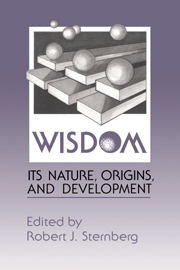Book contents
- Frontmatter
- Contents
- List of contributors
- Preface
- Part I Approaches to the study of wisdom
- Part II Approaches informed by philosophical conceptions of wisdom
- Part III Approaches informed by folk conceptions of wisdom
- Part IV Approaches informed by psychodevelopmental conceptions of wisdom
- 9 The loss of wisdom
- 10 Wisdom and Reflective Judgment: knowing in the face of uncertainty
- 11 Wisdom: the art of problem finding
- 12 An essay on wisdom: toward organismic processes that make it possible
- 13 Conceptualizing wisdom: the primacy of affect–cognition relations
- Part V Integration of approaches and viewpoints
- Name index
- Subject index
13 - Conceptualizing wisdom: the primacy of affect–cognition relations
Published online by Cambridge University Press: 05 June 2012
- Frontmatter
- Contents
- List of contributors
- Preface
- Part I Approaches to the study of wisdom
- Part II Approaches informed by philosophical conceptions of wisdom
- Part III Approaches informed by folk conceptions of wisdom
- Part IV Approaches informed by psychodevelopmental conceptions of wisdom
- 9 The loss of wisdom
- 10 Wisdom and Reflective Judgment: knowing in the face of uncertainty
- 11 Wisdom: the art of problem finding
- 12 An essay on wisdom: toward organismic processes that make it possible
- 13 Conceptualizing wisdom: the primacy of affect–cognition relations
- Part V Integration of approaches and viewpoints
- Name index
- Subject index
Summary
The past decade has ushered in enormous changes in the way in which adult development is construed, particularly in the area of adult cognitive development (e.g., Baltes, Dittmann-Kohli, & Dixon, 1984; Berg & Sternberg, 1985; Cavanaugh & Morton, 1989; Labouvie-Vief, 1981; Labouvie-Vief & Chandler, 1977; Poon, 1985; Sinnott, 1989). Traditional models of aging, which were derived from child-centered conceptions, often stress, at best, stability or, more often, regression in developmental trajectories and have failed to take into account adaptive forms of intelligence in later life. Some of the models that challenge tradition favor contextualism (e.g., Baltes et al., 1984; Berg & Sternberg, 1985; Cavanaugh & Morton, 1989; Poon, 1985), whereas others favor organicism (Kramer, 1989a; Labouvie-Vief, 1981).
The issues surrounding the controversy about whether organicism or contextualism is the preferable model are many and lie beyond the scope of the present chapter (see Dixon, Kramer, & Baltes, 1985; Kahlbaugh, 1989; Kramer, 1987a; Kramer & Bopp, 1989; Labouvie-Vief, 1981; Lerner & Kauffman, 1985; Meacham, 1989; Overton, 1984). However, these models share a united concern that traditional, mechanistic models have failed to take into account the varied and multiple contexts in which development occurs, including the sociohistorical context, the individual's meaning-making activities and goals, the relationship context, or the developmental context (Kramer & Bopp, 1989). Not surprisingly, then, mechanistic models have traditionally resulted in decline or, at best, stability representations of cognitive aging processes. Contextualist and organismic models are more likely to foster growth conceptions (Kramer, 1987b).
- Type
- Chapter
- Information
- WisdomIts Nature, Origins, and Development, pp. 279 - 314Publisher: Cambridge University PressPrint publication year: 1990
- 88
- Cited by



